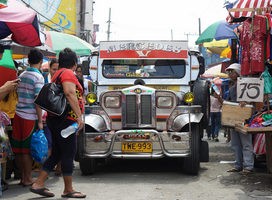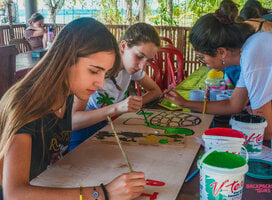Volunteer Programs in Manila, Philippines
Manila is the capital of a country that consists of thousands of beautiful islands. It is also the most densely populated city in the world and hit by 20+ natural disasters every year. There are plenty of volunteering opportunities in and around Manila, especially because the Philippines is one of the most disaster prone countries in the world. It is not a question of if, but when there will be flooding.
The open hearts and lovely smiles of the people living in Manila make each volunteers experience unique and unforgettable. The needs of the population have a wide range, from housing and building rescue boats, to working with youth groups in the communities, including organizing workshops or trainings of any kind. There is a volunteering opportunity available for any person who would like to get involved.
Construction
There are plenty of opportunities to get physically involved as a volunteer, especially in the communities on the outskirts of Manila. There are organizations which work on housing projects, some on the construction of schools, while others are involved in the construction of evacuation centers for communities. Many communities still lack facilities that have been destroyed in the floods after the typhoon Ondoy Ketsana in 2009.
Volunteers who like physical work and do not mind sweating side by side with Filipino workers will have a fantastic and unique experience in Manila. There is room for hands on concrete pours, bricklaying, rendering, painting and other fun jobs on the construction sites. The best thing about the construction work is the close relationship that volunteers will build up with the workers on site, sharing the breaks and lunchtime together in a familial atmosphere.
Capacity Building
Many people and communities simply lack the skills to help themselves build a better future. Volunteers can get involved in both ongoing and one-time trainings and workshops for people. These workshops focus on many skills including helping those who do not know how to promote and sell the products of the community they try to live on. Some communities welcome volunteers to help them with the very basics. In many places they have never been on the internet before or even never worked with a computer before and need help with IT support, setting up filing systems and even basic data entry. These skills are not only needed to provide a better life for them, but also can be used to set up early-warning-systems to keep them safe in certain areas that flood often and are particularly prone to disasters. People of any trade can be very helpful in these kinds of projects but it is especially interesting for volunteers with IT-experience.
Youth Groups
The youth in Manila and its surrounding areas are very interested in working with and learning from foreign volunteers. It is a priority in many communities for the local youth to strengthen their English so that they are prepared to join a competitive, global workforce and advocate for their own rights. Another goal in youth work is to empower disadvantaged youth so that they can be successful and independent when they are in and out of school. This can include teaching them new skills as well as aiding them in running programs that they have initiated on their own.
In many programs volunteers will be given the opportunity to work with various age groups to aid youth groups in organizing workshops in many fields. This not only builds their confidence but gives the youths an invaluable learning opportunity in how to plan both small and large scale events. Creative and motivated people who like to work with youth groups will have an extraordinary experience to see the children grow during the process of learning about themselves and others.
Rescue Boats
The Philippines is one of the most disaster prone countries in the world and therefore there is always a need for disaster risk reduction programs. The fabrication of rescue boats in the communities around Manila is only one of these disaster risk reduction programs. Volunteers can help in the process of the fabrication, help with the painting and get involved in the testing of the boats in shallow water. It is always a great moment when the boats get delivered to the people and the place where they will be used during the next flooding. Meeting their thankful eyes, shaking their hands and leaving the finished boat with them would fulfill any volunteer’s expectations of being actually helpful.
Environmental Projects
Several projects revolve around decreasing the pollution of the city and its nearby rivers. It is also very important to stabilize the higher grounds where people have settled and live. Volunteers work on various solutions to secure roads and river banks in order to make them less vulnerable to erosion during heavy rain and flooding. These projects also secure the health and life of many communities because the access roads to and from their homes will not be washed away or flooded so badly that they cannot be evacuated. The work can consist of the fabrication and filling of flood defenses and physical work at the river banks, among many others. The use of local, economic materials such as coco-fiber is not only helping the obvious need to secure the river beds, but also supports local fabricants.
Volunteering Tips
One of the most important things to do before traveling to a country in South East Asia is to do research on the health risks associated with the area of interest. Volunteers should always consult with their doctors to get the necessary vaccinations for the area a volunteer wants to go to.
Plan your budget! Before volunteering with an organization one should be informed about the living cost in the area and potential extra costs associated with volunteering for an organization, including volunteer contributions. An experienced and organized NGO will inform and protects its volunteers from unexpected expenses.
The Philippines is a tropical country and therefore has several spiders, ants, mosquitoes and other bugs which can affect a volunteer’s experience in and around Manila. No Worries! There are very few poisonous animals in the Philippines. Bug spray and insect repellent will make life more comfortable, especially during the rainy season when there are more mosquitoes.
Visa: It is possible to get a visa on arrival for the first 21 days, which can later be extended. However it may be cheaper to get a visa in the volunteers’ home country, if there is enough time to organize that before.
Insurance: Some Organizations only require general health insurance, but if volunteers work, for example on construction sites, it may be necessary to get additional features for the insurance.
Transportation: Getting around Manila is generally easy and cheap. There are local trains, local busses (called Jeepneys), taxis, and tricycles that provide easy travel and offer a great experience at the same time. Public transport can be very crowded, so it is important to plan ahead if it is needed to be at a certain location at a specific time.
Food: The food in the Philippines is an absolute bonus too. For volunteers who like to be experimental, very special dishes are easy to find. The less adventurous foreigner will also be able to find something tasty on the menu of a restaurant. In some organizations the volunteers will be served lunch from the local communities, which is not only a fantastic experience but also very, very tasty!
Volunteer Support: Volunteers around Manila benefit from the various agencies, embassies, and the immigration office, which are all located in the city. It is easy to extend visas or speak to someone at the embassy if needed. For issues concerning the health of a volunteer, Manila is one of the best places to be. The health care and the dental clinics are some of the best in all of Asia. Volunteers with dietary needs will have no trouble since supermarkets, malls and restaurants with western food can be found all around Manila.
NGO/ Nonprofit/ Volunteer History: There are big NGOs like the Peace Corps or VSO that are coordinated by government agencies. It is more difficult to get access to short-term individual volunteering opportunities with the bigger NGOs because they assign volunteers for long-term stays. Plenty of smaller organizations in Manila will take on volunteers regardless of their trade, age or proposed length of stay.
Questions to Ask: What amenities are available in the area where I will be working? What kind of project will I be working on considering my skills? How many people will I be working with? What are the working hours? Where will I be accommodated/ Do I have to find my own accommodation? How much is the living cost? How far is it to the nearest grocery store/ pharmacy/ laundry place/ internet café/ATM etc?
How to Save Money while Volunteering
The volunteering budget for Manila depends a lot on the organization and its location in Manila. It is important to budget the stay in advance as well as possible and stick to it. The easiest way to save money is always to look at the way the locals live their lives. Some tips include:
- Use public transport instead of taxis
- Try out some local food opposed to world wide food chains
- If the organization does not provide a place to stay, stay in places where you can share a room/apartment/house
- Plan your weekend trips to nearby destinations – wonderful places are never far when you’re in Manila!
Health and Safety of Volunteers in Manila
Volunteers should consult their personal physician or a travel health clinic to know about the requirements considering the vaccines at the time of the travel. The Philippines government requires travelers to be vaccinated from Yellow Fever if they are from an area where Yellow Fever is common. For more information visit the World Health Organization and MD Travel Health sites. Manila and its outskirts are generally safe places to travel. Common sense will be enough to stay out of trouble; however volunteers should always be cautious about scammers and overly friendly strangers. There are street dogs, which are mostly friendly but it is necessary to be careful about unfamiliar dogs.
Contributed by Christian Hillemeyer













